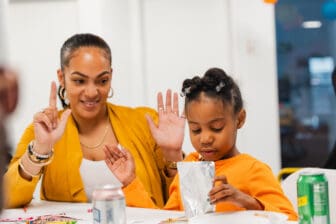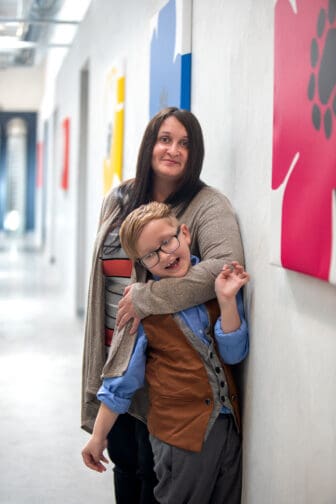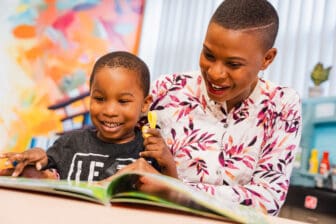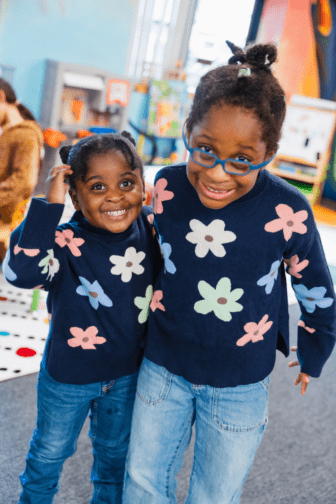Caring Beyond the Classroom
JP’s tutoring and summer enrichment offerings are key elements of our holistic, two-generational model.
JP Boston mom Wendy Hall is not a swimmer, but when she got the chance to register her daughters for swim lessons, she knew she had to seize it. “I just knew that this was something that I wanted to open up my girls to,” she says, “to make sure that they know water safety at this young age and learn and grasp the opportunity.”
Opportunity is the key word. Too many families on the financial margins don’t have the opportunity to expose their children to new experiences like swimming, karate, or even academic tutoring because they don’t have the money or time to make those experiences happen. When you add student parenting to the mix, the opportunities are even fewer.
JP knows that supporting moms includes supporting their children; we’re backing families two generations at a time. That’s why we prioritize academic and socioemotional support for JP kids. Whether it’s early childhood education, summer enrichment, or afterschool tutoring, we nurture our kids year-round.
JP Tutoring: Closing Gaps and Getting Ahead
JP moms often learn about enrichment opportunities in one-on-one coaching sessions or during Sisterhood Hours. JP Baltimore Family Coach Nicole Watford, Ed.D., makes it a point to discuss tutoring as an option for families in her coaching sessions because she knows what a difference it can make for a family who desires academic support or enrichment.
“Tutoring narrows the achievement gaps,” she explains. “Generally speaking, research shows that academic support consistently produces positive outcomes for students like better grades and more confidence.” And, crucially, most JP families otherwise wouldn’t be able to afford tutoring services.
In Baltimore, Boston, Brooklyn, and Las Vegas — JP’s four locations without onsite Child Development Centers — campuses partner with ACLC Tutoring to provide virtual afterschool academic help. ACLC tutor Kathryn “Kathie” Heirigs agrees that the work she and her colleagues are doing helps students make up for learning losses caused by overpopulated classrooms and overextended school practitioners.
“Even if students are receiving services from school, whatever the school has to offer, there still is a gap,” she says.
Some ACLC tutors, like Kathie, have been able to work with JP families from one school year to the next, which strengthens the bond and trust between them. “I believe that my relationship with the mom, because it’s been ongoing, is a little bit stronger than what might come from teachers or tutors at school,” she reflects.
Making tutoring available to JP families also benefits kids who need to stay sufficiently challenged rather than needing to get ahead. But tutoring comes with a stigma of being a struggling student, which is why JP Las Vegas mom Jessica Funderburk and her first grader, Connor, initially shied away from it. Once she gained the perspective that it could help Connor excel, she thought, “Why wouldn’t I give him a chance to have a chance?”
Jessica and Connor decided to go for it and have been working with ACLC’s Judy Mims — affectionately called Miss Judy — for two years now. “He has a great time,” Jessica beams. “He literally was like, ‘I just want to stay home and work with Miss Judy all day — that’s it.’”
JP Baltimore mom Jody Francois’ 4-year-old, Sasha, has very advanced language and verbal skills. Because she’s excelling in that area, Jody requested that her daughter get some extra attention in math. This request thrilled her coach, Nicole, a former kindergarten teacher. “Her daughter’s going to be well-rounded when she goes to kindergarten in the fall, so [tutoring is] such a benefit … whether they need it for support or enrichment.”
Daisy Stanley, a JP Boston mom, found that tutoring did wonders for her second grader, especially in reading and math. “It’s helping her be a little bit more advanced with her peers in school, where the teacher has to give her a little bit extra challenging work,” she explains. A key facet of this approach is that the tutor tailors their sessions precisely to what the child is working on in school.
“We try to mimic it with the tutor so that, whatever areas of challenges, we will work through that so that she can perform better,” Daisy says.
“I believe that my children deserve to experience life, to learn new things, to do things that I’ve never had the opportunity to do.”
Daisy Stanley, JP Boston mom
A Circle of Learning
Communication among JP moms, family coaches, tutors, and teachers places children at the center of a crucial circle of learning that can only bolster their development. From Kathie’s perspective as a tutor, sharing information about a student’s progress is one of her greatest joys.
“After every session I have with every student, I write up session notes. Those go to the parents, the student’s teachers at school, and the Jeremiah coach,” she describes. “Sometimes I get feedback from a teacher. … But I very often hear from the coaches. So, if I’m excited in the session notes, well, here comes a note from the coaches, saying, ‘Oh, I’m excited, too!’ which then makes me more excited.” Kathie will then share that excitement with the mom, who shares it with the child. The cycle feeds itself.
When Nicole began working with ACLC tutors, she was pleasantly surprised to see such detailed notes, which helps her work with both generations of each family in an even more holistic way. “I like to use those opportunities to talk to my mom and say, ‘I see such-and-such did extremely well on whatever the skill was. … How does that seem to appear in connection with their report card, and/or their skill in math?’”
This circle of learning is playing out in an even more nuanced way for Daisy’s family: She and her younger child are also learning from the work her older child is doing with her tutor.
“She’s even refreshing me on some things that I may not remember when I learned in school, so it’s just like, wow!” Daisy says. “And it benefits my son because he sees her on the computer, so I feel like it’s a win-win for everyone in my home.”
Opening Up the World During the Summer
Even when school is not in session, JP makes sure kids have opportunities to learn and grow. “Moms are given up to $1,200 per child to engage in some kind of [summer] experience,” explains Nicole. “It could be multiple experiences that utilize that same $1,200.”
Wendy’s family is one of many who take advantage of JP’s summer enrichment activities. She was concerned about how swimming instruction would affect her older daughter, Luna, who is on the autism spectrum. Luna can experience sensory overload in noisy environments, so having lessons at her local YMCA made Wendy a bit nervous. It turns out she had nothing to fear.
“With this swim instructor, now it was just myself, my other daughter, and her, and sometimes my daughter’s RBT — her registered behavior therapist — from her center,” she recalls. “It was a nice quiet environment that allowed Luna to really focus on what was being taught to her, and it was awesome.”
Summer activities not only provide fun learning experiences that families may not otherwise be able to participate in, but they also offer inclusive options for children like Luna, who attends a year-round center for children with autism. That’s no small thing.
During Luna’s first swimming lesson, Wendy was overjoyed at seeing her child included and engaged with care and respect: “I was clenching my teeth trying to hold back tears,” she says.
Luna also got to try soccer, which she happens to dominate. She took to it so well that her RBT suggested they open up sports for all the children at the autism center — and they did. Luna blazed a trail with her lightning feet!
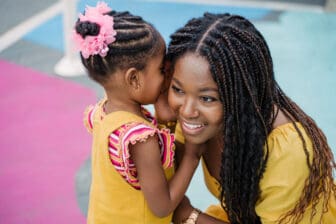
as they hang out in their Baltimore neighborhood.
These kinds of opportunities open up the world for JP kids, and that’s what Daisy, other JP moms, and all good parents want for their children. “I believe that my children deserve to experience life, to learn new things, to do things that I’ve never had the opportunity to do,” she says, “so that they can be more well-rounded individuals and be ready to tackle different things in the world.”
That’s why she’s looking forward to more chances to have her children engage in STEM activities. They’ll likely do more museum and zoo experiences, too, and she loves that the option for memberships allows her children to visit multiple zoos and museums throughout Massachusetts. She wants them to learn, have fun, and have an all-around good summer. “I do like a balance,” she asserts. “I do like the idea of ‘learn, play, relax’ — all of it.”
Jody in Baltimore also wanted to open up her then-3-year-old to more experiences and ensure her increasingly active child, already so advanced in her verbal skills, would be stimulated during the summer and do something that interests her.
“Now she could pick whatever she wants, even at that young age, and I can introduce her to almost anything without having to worry about the price,” Jody says.
Because they could try different experiences, they went with ballet and swimming, and Jody learned that she has a little fish on her hands. “She didn’t want to go back to ballet,” Jody laughed. “All this time, I thought she wanted to be a ballerina, but she ended up loving swimming more.”
The Power of Swimming
“Are we going swimming today?” was a daily refrain in both Wendy’s and Jody’s homes once their daughters started taking lessons. For Luna, who can’t verbally articulate just how much she loves swimming, asking that question while grabbing her floaties, even in the fall, spoke volumes. And the import goes beyond the joy and safety that come with learning to swim.
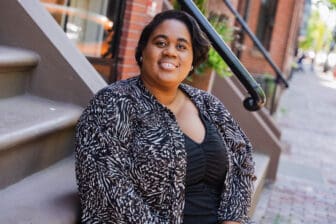
have the opportunity to learn to swim during the summer.
Swimming was one of the most popular summer activities among JP families in 2023, which is especially significant given that JP predominantly serves families of color.
“In the Black community, there’s a higher fatality rate for African Americans and swimming,” Nicole points out, “so this exposure was our great selection for moms last year. We had swimming lessons for some of our moms with kids as young as 2.”
Wendy is aware of this statistic — all the more reason why she was excited that Luna took to swimming.
“Swimming is crucial, especially for children of color — for all children — but for children of color because a lot of times we live in cities where they might not have access to a pool,” she says. “It’s necessary to have information about water safety and learning how to swim.” Wendy considers it a bonus that her child learned how to swim from someone who looks like her.
Besides the safety implications, Daisy’s looking ahead to her second grader’s continued growth and development. “She excelled, and she’s ready to go to the next level,” she explains. “We’re already talking about if she continues swimming, she’s on the way to eventually becoming a lifeguard.”
Supporting Families Two Generations at a Time
By clearing the way for families to have more of the opportunities that their affluent counterparts enjoy, JP is giving moms more space to pour into themselves and their children.
ACLC tutor Kathie takes the creation of that space for moms very seriously. “I’m removing some obstacles to the student’s path to greater education,” she reflects, “but I’m also removing one of the worries or obstacles in the mom’s path to getting her family in a better position.”
JP Teens in the summer
JP’s more mature kids have summer options, too. In 2023, one family used their $1,200 allotment to send their teen to driving school. Another used it to go on college visits.
When it comes to sowing seeds for future development, multiple JP moms shared that they have seen their children grow in confidence and hope that these enrichment experiences contribute to their assertiveness to ask for help as they age. Whether it’s through swimming, karate, or math and reading instruction, JP kids are blossoming through extra support.
Jessica smiles, thinking about the potentially lifelong connections her son is making with other JP kids as he learns and grows. She sees him coming into his own.
“I think it’s been amazing seeing him just walk around like, ‘Hey!’ and that confidence,” she says with certainty. “He’s a happy kid, very happy kid.”
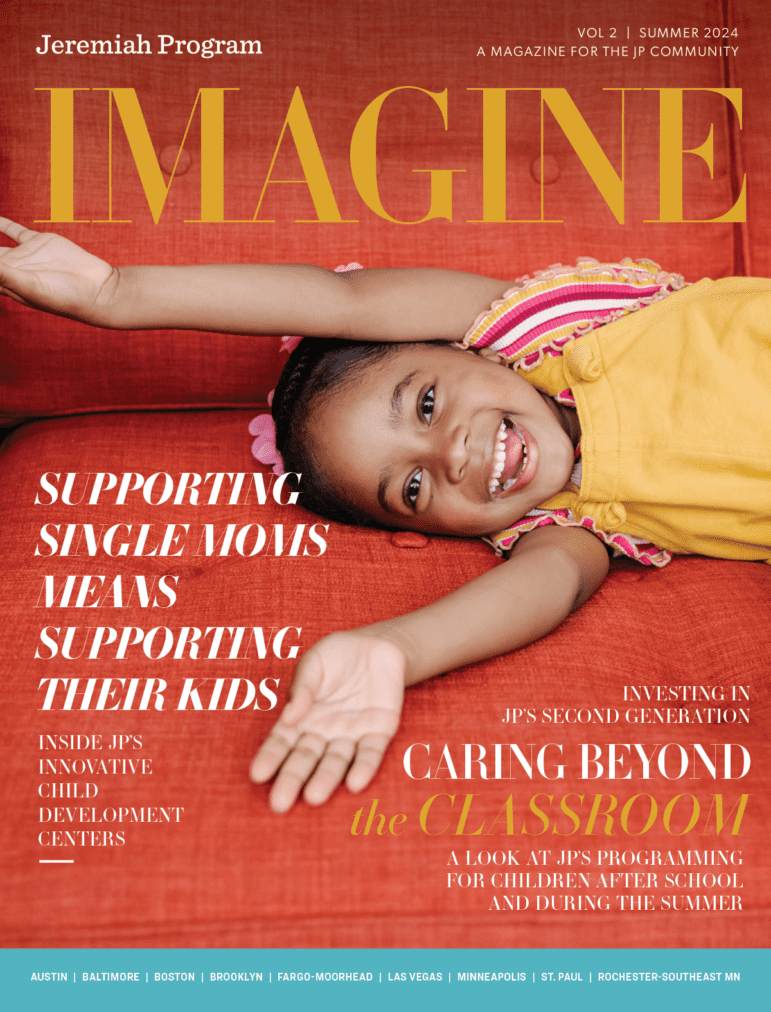
Find this story and more in our magazine, Imagine!
At Jeremiah Program, we know that supporting single mothers means supporting their children. That’s why we’re proud to join the whole family’s journey — two generations at a time — and that’s what the second issue of Imagine is all about.
Hear directly from the college-bound children of a JP alum what their mother taught them about education. Read a Q&A with the entrepreneur daughter of one of JP’s first graduates, who earned her degree in 2000. Learn how JP is investing in the next generation through 529 accounts, tutoring, summer enrichment, and more.
Did this story resonate with you? A monthly gift goes further to support JP families.


